人教版八年级英语下册Unit 5 基础知识点总结
- 格式:doc
- 大小:35.50 KB
- 文档页数:3
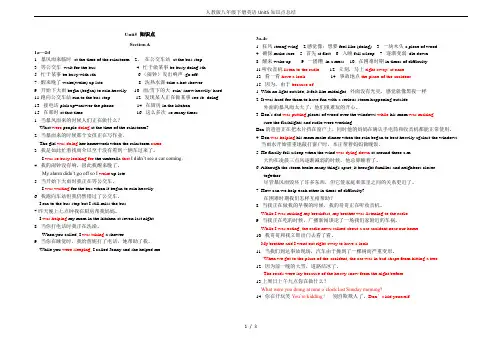
Unit5 知识点Section A1a—2d1. 暴风雨来临时at the time of the rainstorm 2、在公交车站at the bus stop3. 等公交车wait for the bus4. 忙于做某事be busy doing sth.5. 忙于某事be busy with sth.6.(闹钟)发出响声go off7. 醒来晚了wake(woke) up late 8. 洗热水澡take a hot shower9. 开始下大雨begin (began) to rain heavily 10. 雨/雪下的大rain/ snow heavily/ hard 11.跑向公交车站run to the bus stop 12. 发现某人正在做某事see sb. doing 13. 接电话pick up=answer the phone 14. 在厨房in the kitchen15. 在那时at that time 16. 这么多次so many times1. 当暴风雨来的时候人们正在做什么?What were people doing at the time of the rainstorm?2. 当暴雨来的时候那个女孩正在写作业。
The girl was doing her homework when the rainstorm came.3. 我是如此忙着找雨伞以至于没有看到一辆车过来了。
I was so busy looking for the umbrella that I didn’t see a car coming.4. 我的闹钟没有响,因此我醒来晚了。
My alarm didn’t go off so I woke up late.5. 当开始下大雨时我正在等公交车。
I was waiting for the bus when it began to rain heavily.6. 我跑向车站但我仍然错过了公交车。
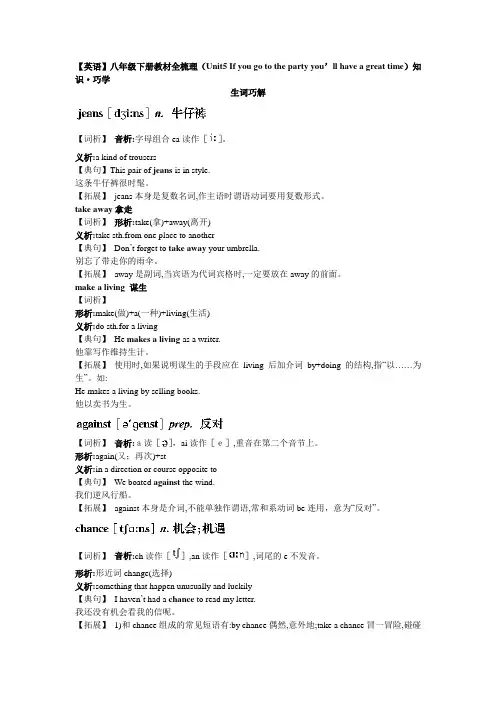
【英语】八年级下册教材全梳理(Unit5 If you go to the party you’ll have a great time)知识·巧学生词巧解【词析】音析:字母组合ea读作[]。
义析:a kind of trousers【典句】This pair of jeans is in style.这条牛仔裤很时髦。
【拓展】jeans本身是复数名词,作主语时谓语动词要用复数形式。
take away拿走【词析】形析:take(拿)+away(离开)义析:take sth.from one place to another【典句】Don’t forget to take away your umbrella.别忘了带走你的雨伞。
【拓展】away是副词,当宾语为代词宾格时,一定要放在away的前面。
make a living 谋生【词析】形析:make(做)+a(一种)+living(生活)义析:do sth.for a living【典句】He makes a living as a writer.他靠写作维持生计。
【拓展】使用时,如果说明谋生的手段应在living后加介词by+doing的结构,指“以……为生”。
如:He makes a living by selling books.他以卖书为生。
【词析】音析:a读[],ai读作[e],重音在第二个音节上。
形析:again(又;再次)+st义析:in a direction or course opposite to【典句】We boated against the wind.我们逆风行船。
【拓展】against本身是介词,不能单独作谓语,常和系动词be连用,意为“反对”。
【词析】音析:ch读作[],an读作[],词尾的e不发音。
形析:形近词change(选择)义析:something that happen unusually and luckily【典句】I haven’t had a chance to read my letter.我还没有机会看我的信呢。
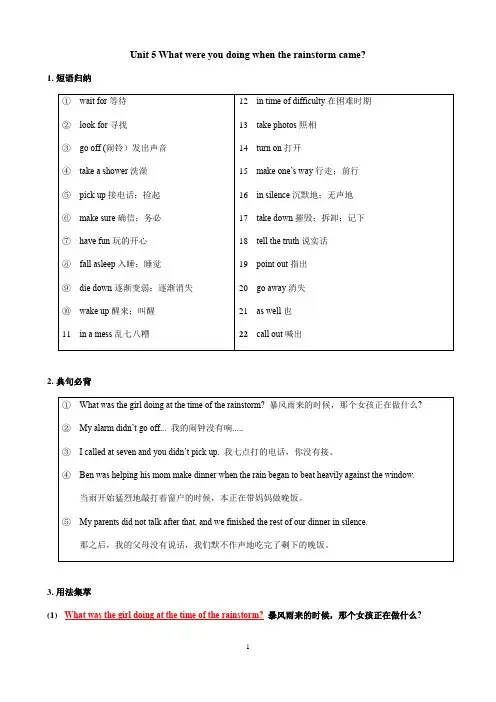
Unit 5 What were you doing when the rainstorm came?1.短语归纳2.典句必背3.用法集萃(1)What was the girl doing at the time of the rainstorm?暴风雨来的时候,那个女孩正在做什么?❖本句是特殊疑问句,时态是过去进行时,结构是“What+was/were+主语+doing+其他?”,用于询问某人在过去的某个时间正在做的事情。
例:—What were you doing at nine o’clock yesterday evening? 昨天晚上九点你正在做什么?—I was watching TV at home. 我正在家里看电视。
❖拓展:过去进行时描述过去某个时刻正在发生的动作或存在的状态,结构是“was/ were+动词的现在分词”。
例:When I got home my mother was cooking. 我到家的时候我妈妈正在做饭(2)My alarm didn’t go off... 我的闹钟没有响.....❖go off意为“(闹钟)发出响声”例:My alarm goes off at six every morning. 我的闹钟每天早晨6点响。
❖归纳:go off还有“离开”和“变质”之意。
例:Bob went off to get a drink. 鲍勃拿饮料去了。
Meat goes off quickly in hot weather. 热天肉变质得快。
❖拓展:go的短语(3)I called at seven and you didn’t pick up. 我七点打的电话,你没有接。
❖pick up意为“接电话”。
pick up有如下含义:(4)I called again at eight and you didn’t answer then either. 我八点再打来,你也没接。
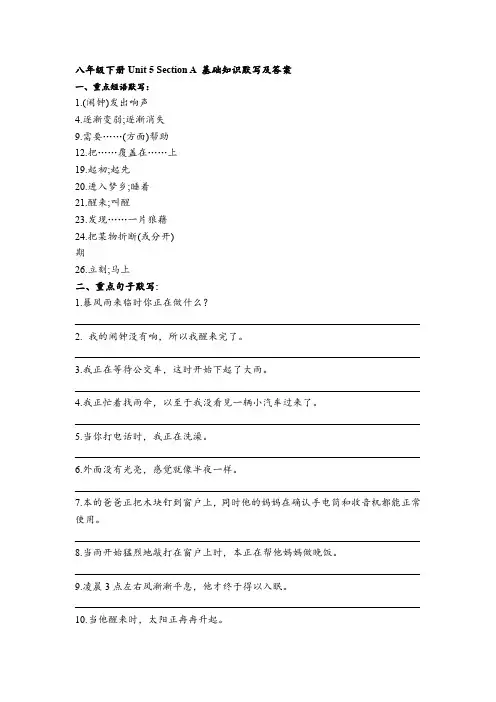
八年级下册Unit 5 Section A 基础知识默写及答案一、重点短语默写:1.(闹钟)发出响声4.逐渐变弱;逐渐消失9.需要……(方面)帮助12.把……覆盖在……上19.起初;起先20.进入梦乡;睡着21.醒来;叫醒23.发现……一片狼藉24.把某物折断(或分开)期26.立刻;马上二、重点句子默写:1.暴风雨来临时你正在做什么?_____________________________________________________________________ 2.我的闹钟没有响,所以我醒来完了。
_____________________________________________________________________ 3.我正在等待公交车,这时开始下起了大雨。
_____________________________________________________________________ 4.我正忙着找雨伞,以至于我没看见一辆小汽车过来了。
_____________________________________________________________________ 5.当你打电话时,我正在洗澡。
_____________________________________________________________________ 6.外面没有光亮,感觉就像半夜一样。
_____________________________________________________________________ 7.本的爸爸正把木块钉到窗户上,同时他的妈妈在确认手电筒和收音机都能正常使用。
_____________________________________________________________________ 8.当雨开始猛烈地敲打在窗户上时,本正在帮他妈妈做晚饭。
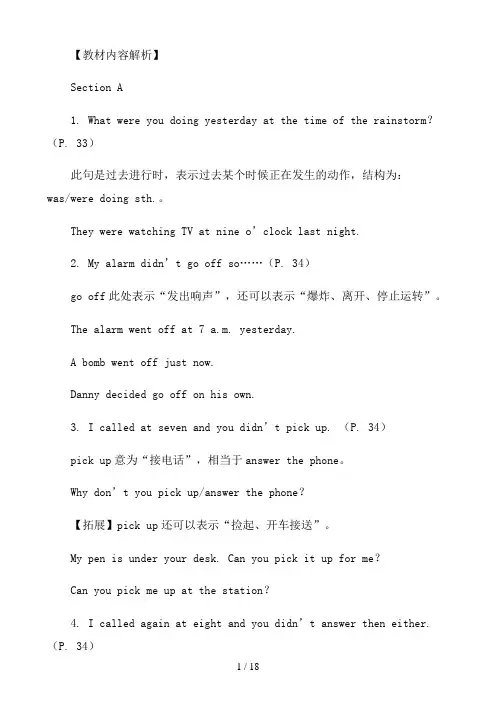
【教材内容解析】Section A1. What were you doing yesterday at the time of the rainstorm?(P. 33)此句是过去进行时,表示过去某个时候正在发生的动作,结构为:was/were doing sth.。
They were watching TV at nine o’clock last night.2. My alarm didn’t go off so……(P. 34)go off此处表示“发出响声”,还可以表示“爆炸、离开、停止运转”。
The alarm went off at 7 a.m. yesterday.A bomb went off just now.Danny decided go off on his own.3. I called at seven and you didn’t pick up. (P. 34)pick up意为“接电话”,相当于answer the phone。
Why don’t you pick up/answer th e phone?【拓展】pick up还可以表示“捡起、开车接送”。
My pen is under your desk. Can you pick it up for me?Can you pick me up at the station?4. I called again at eight and you didn’t answer then either. (P. 34)also, too, as well与either都可以表示“也”,但是用法不同。
also放在句中行为动词前,be动词、助动词和情态动词之后。
He also wants to go.too用于肯定句中,放在句尾,前面用逗号隔开。
He wants to go,either.as well用于肯定句中,放在句尾,前面不用逗号隔开。
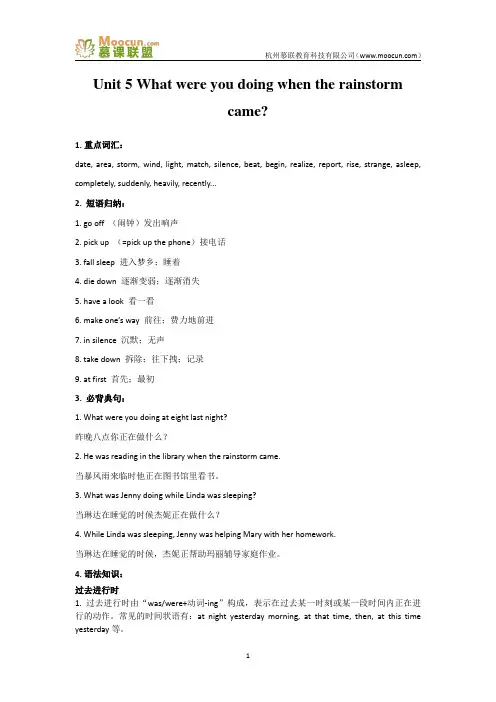
Unit 5 What were you doing when the rainstormcame?1.重点词汇:date, area, storm, wind, light, match, silence, beat, begin, realize, report, rise, strange, asleep, completely, suddenly, heavily, recently...2. 短语归纳:1. go off (闹钟)发出响声2. pick up (=pick up the phone)接电话3. fall sleep 进入梦乡;睡着4. die down 逐渐变弱;逐渐消失5. have a look 看一看6. make one’s way 前往;费力地前进7. in silence 沉默;无声8. take down 拆除;往下拽;记录9. at first 首先;最初3. 必背典句:1. What were you doing at eight last night?昨晚八点你正在做什么?2. He was reading in the library when the rainstorm came.当暴风雨来临时他正在图书馆里看书。
3. What was Jenny doing while Linda was sleeping?当琳达在睡觉的时候杰妮正在做什么?4. While Linda was sleeping, Jenny was helping Mary with her homework.当琳达在睡觉的时候,杰妮正帮助玛丽辅导家庭作业。
4.语法知识:过去进行时1. 过去进行时由“was/were+动词-ing”构成,表示在过去某一时刻或某一段时间内正在进行的动作。
常见的时间状语有:at night yesterday morning, at that time, then, at this time yesterday等。
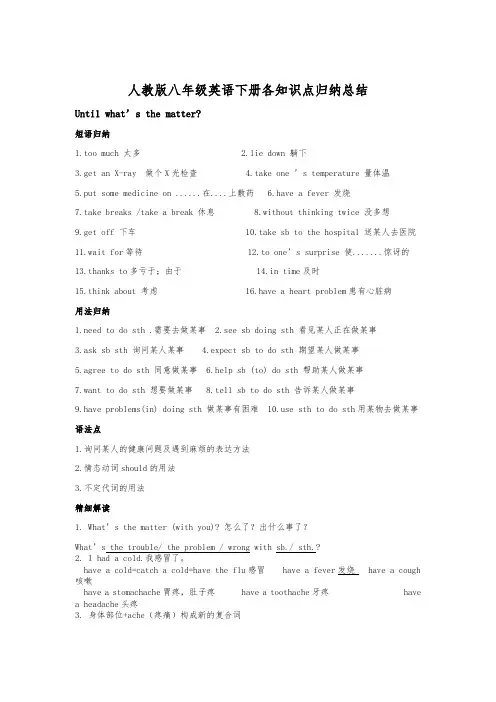
人教版八年级英语下册各知识点归纳总结Unti1 what’s the matter?短语归纳1.too much 太多2.lie down 躺下3.get an X-ray 做个X光检查4.take one ’s temperature 量体温5.put some medicine on ......在....上敷药6.have a fever 发烧7.take breaks /take a break 休息 8.without thinking twice 没多想9.get off 下车 10.take sb to the hospital 送某人去医院11.wait for等待 12.to one’s surprise 使.......惊讶的13.thanks to多亏于;由于 14.in time及时15.think about 考虑 16.have a heart problem患有心脏病用法归纳1.need to do sth .需要去做某事2.see sb doing sth 看见某人正在做某事3.ask sb sth 询问某人某事4.expect sb to do sth 期望某人做某事5.agree to do sth 同意做某事6.help sb (to) do sth 帮助某人做某事7.want to do sth 想要做某事 8.tell sb to do sth 告诉某人做某事9.have problems(in) doing sth 做某事有困难 e sth to do sth用某物去做某事语法点1.询问某人的健康问题及遇到麻烦的表达方法2.情态动词should的用法3.不定代词的用法精细解读1. What’s the matter (with you)? 怎么了?出什么事了?What’s the trouble/ the problem / wrong with sb./ sth.?2. I had a cold.我感冒了。
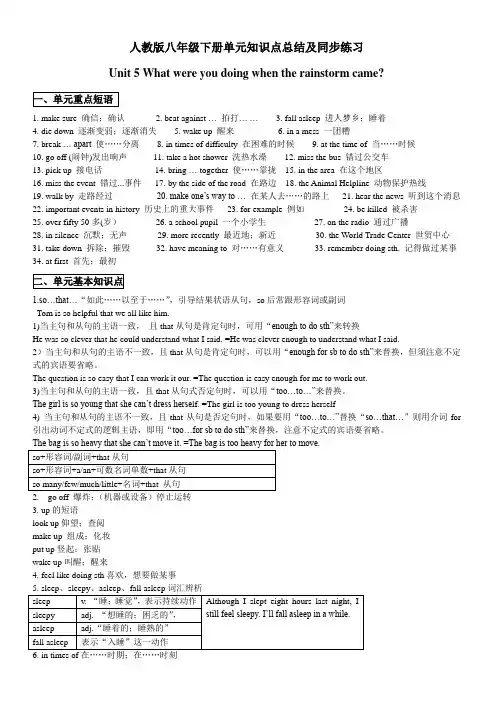
人教版八年级下册单元知识点总结及同步练习Unit 5 What were you doing when the rainstorm came?1. make sure 确信;确认2. beat against …拍打… …3. fall asleep 进人梦乡;睡着4. die down 逐渐变弱;逐渐消失5. wake up 醒来6. in a mess 一团糟7. break … apart 使……分离8. in times of difficulty 在困难的时候9. at the time of 当……时候10. go off (闹钟)发出响声11. take a hot shower 洗热水澡12. miss the bus 错过公交车13. pick up 接电话14. bring … together 使……靠拢15. in the area 在这个地区16. miss the event 错过...事件17. by the side of the road 在路边18. the Animal Helpline 动物保护热线19. walk by 走路经过20. make one’s way to… 在某人去……的路上21. hear the news 听到这个消息22. important events in history 历史上的重大事件23. for example 例如24. be killed 被杀害25. over fifty 50多(岁)26. a school pupil 一个小学生27. on the radio 通过广播28. in silence 沉默;无声29. more recently 最近地;新近30. the World Trade Center 世贸中心31. take down 拆除;摧毁32. have meaning to 对……有意义33. remember doing sth. 记得做过某事34. at first 首先;最初1.so…that…“如此……以至于……”,引导结果状语从句,so后常跟形容词或副词Tom is so helpful that we all like him.1)当主句和从句的主语一致,且that从句是肯定句时,可用“enough to do sth”来转换He was so clever that he could understand what I said. =He was clever enough to understand what I said.2)当主句和从句的主语不一致,且that从句是肯定句时,可以用“enough for sb to do sth”来替换,但须注意不定式的宾语要省略。
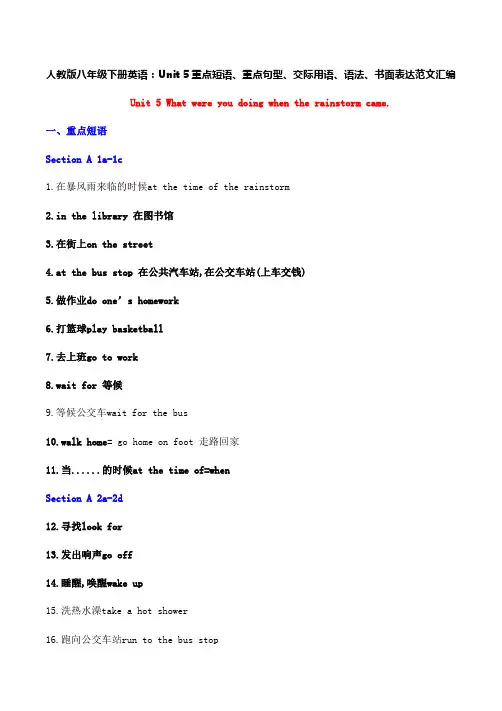
人教版八年级下册英语:Unit 5重点短语、重点句型、交际用语、语法、书面表达范文汇编Unit 5 What were you doing when the rainstorm came.一、重点短语Section A 1a-1c1.在暴风雨来临的时候at the time of the rainstorm2.in the library 在图书馆3.在街上on the street4.at the bus stop 在公共汽车站,在公交车站(上车交钱)5.做作业do one’s homework6.打篮球play basketball7.去上班go to work8.wait for 等候9.等候公交车wait for the bus10.walk home= go home on foot 走路回家11.当......的时候at the time of=whenSection A 2a-2d12.寻找look for13.发出响声go off14.睡醒,唤醒wake up15.洗热水澡take a hot shower16.跑向公交车站run to the bus stop17.错过了公交车miss the bus18.昨天早上yesterday morning19.昨天晚上last night20.pick up(pick up the phone)=answer the phone接电话21.in the kitchen在厨房22.take/have a shower 洗澡23.at that time在那时24.so many +复数名词,这/那么多25.那么多次so many timesSection A 3a-3c26.外面狂风大作strong winds outside27.black clouds 乌云28.with no light outside=without light outside外面没有光29.feel like好像,感觉30.就像午夜/半夜feel like midnight31.一场猛烈的暴风雨a heavy rainstorm32.in the area 在这个地区(区域)33.in the neighborhood 在附近(街区/住宿区/小区/社区)34.pieces of wood 木片/块35.make sure 确保;查明;确信;确认;保证36.put ...on the table 把..放在桌子上37.做晚饭make dinner38.beat against... 拍打,敲打……39.after dinner 晚饭后40.玩纸牌游戏play a card game41.玩得开心have fun with...42.at first =first of all=at the beginning首先43.finally =at last=in the end最后44.fall asleep睡着/进入梦乡45.go to bed/\go to sleep 去睡觉46.逐渐减弱/消失die down47.(声音、光线等)渐弱/渐无die away48.消失,灭绝die out49.死于die of/from50.go outside with sb. 和某人出去51.in a mess 一团糟,乱七八糟,乱糟糟的,一片混乱52.fallen trees 倒下的树53.破碎的窗玻璃,损坏的窗户broken windows54.everywhere=here and there到处55.clean up打扫干净,清扫56.break (many things) apart把(许多东西)弄得支离破碎,破坏了许多东西57.把......破坏/折断/分开break...apart58.bring sb. closer together把......的距离/关系拉近;使……靠拢/更亲密了59.bring families and neighbors closer together让家人和邻居们的关系更紧密了60.in times of difficulty 在困难的时候/期Section A Grammar Focus-4c61.昨天晚上八点钟at eight last night62.下大雨/暴雨rain heavily/hard63.帮助某人做某事help sb. with64.拍照take photos65.买饮料buy a drink66.弹钢琴play the piano67.离开家,离开房子leave the house68.打开收音机turn on the radio69.打开turn on70.关闭turn off71.take the car to the car wash开车到洗车场72.听收音机listen to the radio73.广播新闻radio news74.谈论talk about75.一起车祸a car accident76.出去go out77.立刻,马上right away=at once=right now=in a minute78.看,看一看have a look=look at79.到达事故现场get to the place of the accident80.到达 get to=reach=arrive in(大地点)/at(小地点)81.严重变形in a bad shape82.hitting a tree由于撞到树上83.因为,由于because of84.前一天晚上下大雪the heavy snow from the before night85.上个星期天早上 last Sunday morning86.那你呢?What/How about you?87.你在开玩笑吧,你简直是在开玩笑。
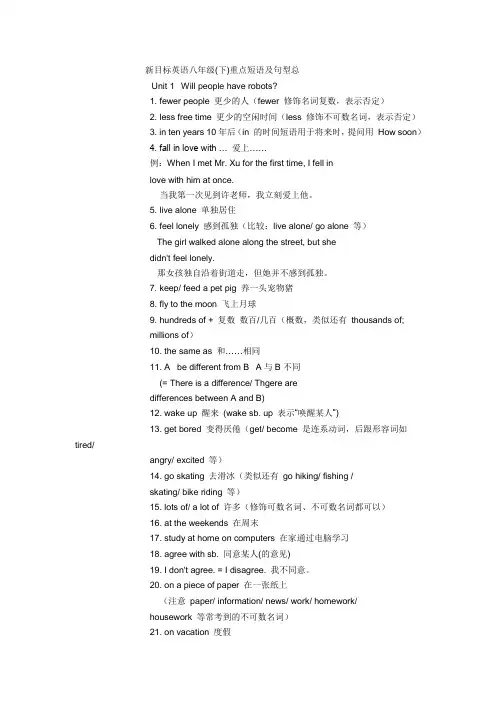
新目标英语八年级(下)重点短语及句型总Unit 1 Will people have robots?1. fewer people 更少的人(fewer 修饰名词复数,表示否定)2. less free time 更少的空闲时间(less 修饰不可数名词,表示否定)3. in ten years 10年后(in 的时间短语用于将来时,提问用How soon)4. fall in love with … 爱上……例:When I met Mr. Xu for the first time, I fell inlove with him at once.当我第一次见到许老师,我立刻爱上他。
5. live alone 单独居住6. feel lonely 感到孤独(比较:live alone/ go alone 等)The girl walked alone along the street, but shedidn't feel lonely.那女孩独自沿着街道走,但她并不感到孤独。
7. keep/ feed a pet pig 养一头宠物猪8. fly to the moon 飞上月球9. hundreds of + 复数数百/几百(概数,类似还有thousands of;millions of)10. the same as 和……相同11. A be different from B A与B不同(= There is a difference/ Thgere aredifferences between A and B)12. wake up 醒来(wake sb. up 表示“唤醒某人”)13. get bored 变得厌倦(get/ become 是连系动词,后跟形容词如tired/angry/ excited 等)14. go skating 去滑冰(类似还有go hiking/ fishing /skating/ bike riding 等)15. lots of/ a lot of 许多(修饰可数名词、不可数名词都可以)16. at the weekends 在周末17. study at home on computers 在家通过电脑学习18. agree with sb. 同意某人(的意见)19. I don't agree. = I disagree. 我不同意。
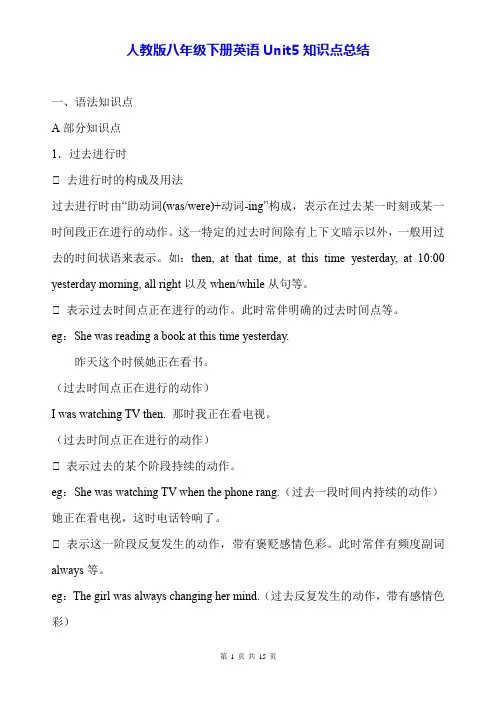
人教版八年级下册英语Unit5知识点总结一、语法知识点A部分知识点1.过去进行时❶ 去进行时的构成及用法过去进行时由“助动词(was/were)+动词-ing”构成,表示在过去某一时刻或某一时间段正在进行的动作。
这一特定的过去时间除有上下文暗示以外,一般用过去的时间状语来表示。
如:then, at that time, at this time yesterday, at 10:00 yesterday morning, all right以及when/while从句等。
❶ 表示过去时间点正在进行的动作。
此时常伴明确的过去时间点等。
eg:She was reading a book at this time yesterday.昨天这个时候她正在看书。
(过去时间点正在进行的动作)I was watching TV then. 那时我正在看电视。
(过去时间点正在进行的动作)❶ 表示过去的某个阶段持续的动作。
eg:She was watching TV when the phone rang.(过去一段时间内持续的动作)她正在看电视,这时电话铃响了。
❶ 表示这一阶段反复发生的动作,带有褒贬感情色彩。
此时常伴有频度副词always等。
eg:The girl was always changing her mind.(过去反复发生的动作,带有感情色彩)这个女孩老是改变主意。
❶ 表示过去动作延迟到以后发生,即用过去进行表过去将来,此类动词是一些位置的变化的词。
eg:He told me that he was going soon.(过去进行表将来)他告诉我他很快就要走了。
❶ 过去进行时的一般疑问句句型:Be(Was/Were)+主语+现在分词+其他?肯定回答:Yes,主语+be(was/were).否定回答:No,主语+be(was/were) not.eg:--Were you cooking at that time? 那时,你在做饭吗?--Yes, I were.是的。
八年级英语下册全册各单元知识点考点整理Unit 1 what's the matter?一、重点短语1.too much太多2.lie down躺下3.get an X-ray做个X光检查4.take one’s temperature量体温5.put some medicine on......在....上敷药6.have a fever发烧7.take breaks/take a break休息8.without thinking twice没多想9.get off下车10.take sb to the hospital送某人去医院11.wait for等待12.to one’s surprise使.......惊讶的13.thanks to多亏于;由于14.in time及时15.think about考虑16.have a heart problem患有心脏病17.get into the trouble遇到麻烦18.do the right thing做正确的事情事情19.fall down摔倒20.put......on sth把...放在某物上21.get hit/sunburned摔伤/烧伤22.be interested in对.....感兴趣23.be used to习惯于....24.take risks/take a risk挑战25.lose one’s life失去生命26.because of因为27.run out of用完28.cut off切除29.get out of从...出来30.make a decision/decisions做决定31.be in control of掌管;管理32.give up放弃主要句型1.It’s+形容词+for sb.+to do sth.做某事对某人来说是…的。
It’s important to do sth.做某事很重要。
人教版英语八年级下册Unit 5What were you doing when the rainstorm came?eful expressions.1.at the time of ...在...的时候2.wait for the bus at the bus stop在公交车站等车3.go off发出响声4.take a hot shower洗热水澡5. begin to rain heavily开始下大雨6.miss the bus误了车7.pick up接电话9. strong winds强风11.a heavy rainstorm一阵强风暴雨13. make sure确保15.play a card game玩纸牌17. fall asleep入睡19.wake up醒来21. fallen trees倒树23.join sb加入某人25.help each other彼此相互帮助27.take the car to the car wash送车去洗29.a car accident车事故31.have a look (at...)看33.the heavy snow大雪35. by the side of the road在马路边上37.make one way (to...)前往...39. in history在历史上41.over 50超过50岁43.at that time在那时45.be completely shocked完全被震惊了47. in silence安静地49.have meaning to sb对某人有意义51.look out of向外面看去53.tell the truth讲实话8.bring people closer致使人们更严紧10.black clouds黑云12.put pieces of wood over the windows将木头板覆盖在窗户上14.beat heavily agianst the windows利害的敲击着窗户16. at first刚开始18.die down逐渐消失20.find the neighborhood in a mess发现小区一团遭22. broken windows破窗户24. break ...apart使..支离破碎26. in times of difficulty:在困难时期28.listen to the radio听收音机30. the place of the accident事故发生地32.be in bad shape形状不佳34.Are you kidding?你开玩笑了?36. walk by路过38. the news of important events重大事件的洗牌40.on this day在这一天42. a school pupil小学生44.hear the news on the radio在收音机上收听消息46.the rest of剩余的...48.be taken down by terrorists被恐怖分子摧毁50.remember doing sth记得做过了某事52.be shocked to do sth做某事感到震惊54.not everyone并非每个人55. get killed=be killed被杀56.have trouble/problems/difficulty doing sth做某事有困难57.be important to对某人严重58.point sth out to sb向某人指出59.stop breathing停止呼吸60. call out the winner大声喊出赢家II. Key sentences1.---What was she doing at the time of the rainstorm? ---She was doing her homework.2.-What were you doing when the rainstorm came?-I was taking a shower when the rainstorm came.3.While Linda was sleeping,Jenny was helping Mary with her homework.4.With no light outside,it felt like midnight.5.Ben’s dad was putting p ieces of wood over the windows while his mom was making sure theflashlights and the radio were working.6.Ben was helping his mom make dinner when the rain began to beat heavily against the windows.7.He finally fell asleep when the wind was dying down at around 3:00 a.m.8.Although some people may not remember who killed him,they remember what they were doingwhen they heard the news.9.My parents were completely shocked.My parents did not talk after that and we finished the restof our dinner in silence.10.Even the date-September 11,2002-has meaning to most Americans.。
人教版八年级下册英语Unit 5单元语法知识点总结本单元重点短语的具体用法1. make sure:确信;确认。
例如:Make sure you lock the door before you leave.(在你离开之前,确保锁好门。
)2. beat against...:拍打……。
例如:The waves were beating against the shore.(波浪拍打着海岸。
)3. fall asleep:进入梦乡;睡着。
例如:I fell asleep while watching TV.(我看电视时睡着了。
)4. die down:逐渐变弱;逐渐消失。
例如:The fire died down after the firefighters arrived.(消防员到达后,火逐渐熄灭了。
)5. wake up:醒来。
例如:I usually wake up at 7 o'clock in the morning.(我通常早上7 点醒来。
)6. in a mess:一团糟。
例如:The room is in a mess.(房间一团糟。
)7. break...apart:使……分离。
例如:The police had to break the door apart to enter the room.(警察不得不破门而入进入房间。
)8. in times of difficulty:在困难的时候。
例如:We should help each other in times of difficulty.(在困难的时候,我们应该互相帮助。
)9. at the time of:当……时候。
例如:At the time of the accident, I was sleeping.(在事故发生时,我正在睡觉。
)10. go off:(闹钟)发出响声。
例如:The alarm went off at 6 o'clock.(闹钟在6 点钟响了。
Unit 5 What were you doing when therainstorm came?A部分重点单词★ 根据汉语提示默写出下列单词1.暴风雨n.2.闹钟n.3.突然;忽然adv.4.奇特的;奇怪的adj.5.暴风雨n. (简写)6.开始v.7.在很大程度上;大量地adv.8.风n.9.光;光线;光亮n.10.报道;公布v.&n.11.地域;地区n.12.木;木头n.13.窗;窗户n.14.手电筒;火炬n.15.火柴n.16.倚;碰;撞prep.17.睡着adj.18.升起;增加;提高v.&n.19.倒下的;落下的adj.20.分离;分开adv.21.覆盖着冰的;冰冷的adj.22.开玩笑;欺骗v.23.敲打;打败v.★ 写出下列单词变形1.sudden(形容词)⎼______________(副词)2.begin⎼______________(过去式)⎼______________(现在分词)3.strange (形容词)⎼______________(名词)4.sleep (名词)⎼______________(形容词)5.beat⎼______________(过去式)6.ice (名词)⎼______________(形容词)7.fall⎼______________(过去式)⎼______________(过去分词)8.go⎼______________ (过去式)9.heavy (形容词)⎼______________(副词)10.wind (名词)⎼______________(形容词)11.match⎼______________(复数)12.rise⎼______________(过去式)13.kid⎼______________(现在分词)重点短词★ 根据汉语提示默写出下列短语1.接电话2.看一看3.逐渐变弱;逐渐消失4.(闹钟)发出响声5.去上班6.等待7.在公交车站8.下大雨9.看见某人正在做某事10.洗淋浴11.这么多次12.需要……(方面)帮助13.开始做某事14.在那时15.感觉像16.确保17.外面没有灯光18.把…覆盖在…上19.把某物放在桌子上20.猛烈地敲打着窗户21.玩得愉快22.起初;起先23.进入梦乡;睡着24.和某人一起出去25.发现……一片狼藉26.把某物折断(或分开)27.帮助某人做某事28.做晚饭29.玩纸牌游戏30.到达事故发生地31.醒来;叫醒32.在困难时33.立刻;马上34.在图书馆35.在大街上重点句子★ 根据汉语提示默写出下列句子1.昨天暴风雨来临时人们正在干什么?2.当暴风雨突然来临时,你正在做什么?3.因此在你睡觉的时候,我打电话给珍妮,她帮了我。
人教版英语八下Unit5知识点必背必背单词1. rainstorm (n.) 暴风雨→rain (n.) 雨+storm (n.) 暴风雨2. alarm (n.) 闹钟3. begin (v.) 开始→began(过去式)→begun(过去分词)→beginning(现在分词)4. heavily (adv.) 在很大程度上;大量地→heavy (adj.) 沉重的5. suddenly (adv.) 突然;忽然6. strange (adj.) 奇特的;奇怪的→strangely (adv.) 奇特地→stranger (n.) 陌生人7. storm (n.) 暴风雨8. wind (n.) 风→windy (adj.) 有风的9. light (n.) 光;光线;光亮10. report (v. /n.) 报道;公布→reporter (n.) 记者11. area (n.) 地域;地区12. wood (n.) 木;木头→wooden (adj.) 木制的13. window (n.) 窗;窗户14. flashlight (n.) 手电筒;火炬→flash (n.) 闪光+light (n.) 光线15. match (n.) 火柴→match (n.) 比赛16. beat (v.) 敲打;打败→beat (过去式)→beaten(过去分词)17. against (prep.) 倚;碰;撞18. asleep (adj.) 睡着→fall asleep 进入梦乡19. rise (v.) 升起;增加;提高→rose(过去式)→risen(过去分词)20. fallen (adj.) 倒下的;落下的→fall (v.) 落下21. apart (adv.) 分离;分开22. icy (adj.) 覆盖着冰的;冰冷的→ice (n.) 冰23. kid (v.) 开玩笑→kidded(过去)→kidded(过去分词)→kidding(现在分词)14. realize (v.) 理解;领会;认识到25. passage (n.) 章节;段落26. pupil (n.) 学生pletely (adv.) 彻底地;完全地→ complete (adj. ) 完全的28. shocked (adj.) 惊愕的;受震惊的→ shock (n.) 震惊29. silence (n.) 沉默;缄默;无声→ silent (adj.) 寂静的;无声的30. recently (adv.) 不久前;最近→ recent (adj.) 最近的31. terrorist (n.) 恐怖主义者;恐怖分子32. date (n.) 日期;日子33. tower (n.) 塔;塔楼34. truth (n.) 实情;事实→ true (adj.) 真实的→ (to) tell the truth 说实话必背短语1. go off(闹钟)发出响声2. pick up 接电话3. feel like 感觉好像4. wake up 睡醒;醒来5. die down 逐渐变弱;逐渐消失6. have a look 看一看7. make one’s way 前往;费力地前进8. in silence 沉默;无声9. take down 拆除;往下拽;记录10. have meaning to 对……有意义11. at first 起初;起先必背句子1. —What were you doing at eight last night?昨晚8 点你在做什么?—I was taking a shower. 我在洗淋浴。